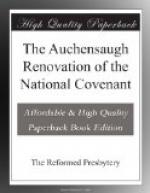“But we have been so far from such endeavours, that there hath been a stupid submission to our rulers and great ones, breaking down and ruining the whole work of reformation, razing the bulwarks thereof, rescinding the laws in favour of the same, and not only breaking but burning the covenants for preserving it, enacting the breaches thereof, and declaring the obligation thereof void and criminal to be, owned; and, upon the ruins thereof, setting up abjured Diocesan Erastian Prelacy, with its concomitant bondage of patronages—a blasphemous and sacrilegious supremacy and arbitrary power in magistrate over church and state. There was little conscience made of constant endeavours to preserve the reformation, when there was not a seasonable testimony exhibited against these audacious and heaven-daring attempts; when our ministers were by a wicked edict ejected from their charges, both they and the people too easily complied with it. Albeit, in the National Covenant, the land is obliged to defend the reformation, and to labour by all means lawful to recover the purity and liberty of the gospel, by forbearing the practice of all novations introduced in the worship of God, or approbation of the corruptions of the public government of the kirk: yet was there given all the approbation required by law of the novation and corruption of Prelacy by hearing the Prelatic curates. Both ministers and people, in a great measure complied with, submitted unto, and connived at the encroachments of the supremacy and absolute power, both in accepting and countenancing the former indulgences and later toleration; the generalty took and subscribed oaths and bonds imposed during the reigns of these tyrants, Charles II. and James Duke of York, pressing conformity with the then establishments of church and state, most contrary to the reformation which the nation had sworn to preserve; some of these




